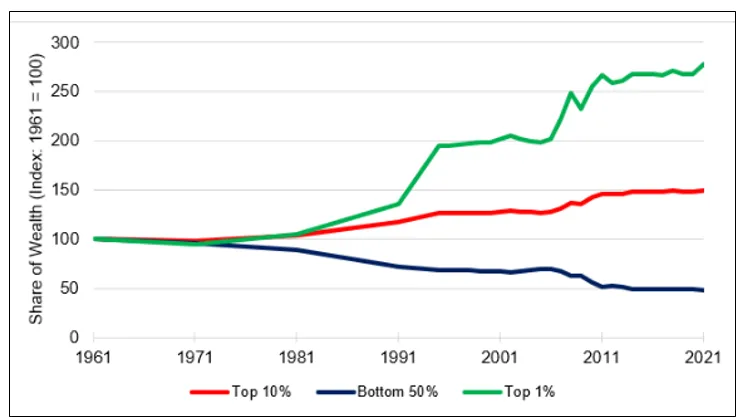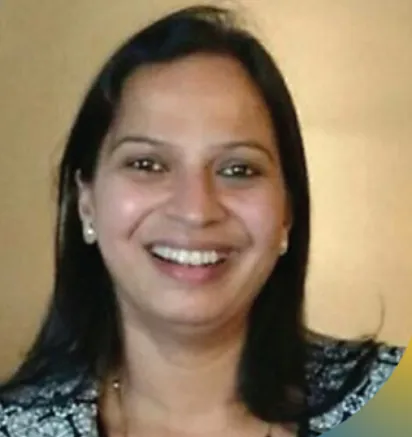
India, having surpassed China as the most populous nation in the world, is facing challenges due to its fast-growing population. With over 1.4 billion people and an estimated annual growth rate of approximately 1 percent, this demographic trend has complex and far-reaching implications on human development in India. India's population is expanding at an unsustainable rate and is projected to surpass 1.5 billion people by 2030 and 2 billion people by 2050.
Figure 1:
 Source: Rebecca Bundhun, The National
Source: Rebecca Bundhun, The National
The country's rapid population growth puts pressure on resources and services, leading to environmental degradation, poverty, and inequality. The burden on the healthcare system increases, making access to quality healthcare a challenge. Education infrastructure struggles to meet the needs of a growing population, and urbanisation strains infrastructure and basic services. Environmental concerns arise due to the large population's impact on natural resources. Additionally, population growth also creates a dearth of employment opportunities.
Only through a holistic and integrated approach can India reap the benefits of demographic change and achieve equitable and sustainable development for its growing population.
Economically, the expanding population necessitates the creation of adequate employment opportunities to accommodate the growing workforce. As per the Center for Monitoring Indian Economy, unemployment in India is at an all-time high of 8.5 percent. Another challenge is poverty<1>, with nearly 16.4 percent population living in poverty and about 4.2 percent living in severe poverty. Figure 2 below indicates the drastic increase in wealth inequality in India in the past four decades, with the top 10 percent possessing more than 60 percent of the total wealth. It also indicates the decline in wealth of the bottom 50 percent of the population.
Figure 2:
 Source: Maitreesh Ghatak et al., The India Forum
Source: Maitreesh Ghatak et al., The India Forum
Addressing poverty and wealth inequality will become increasingly difficult as populations grow, requiring equitable distribution of resources and access to essential services. The strain on infrastructure such as housing and transport will increase, and large investments will be required to meet the needs of the growing population. As the population continues to grow, it becomes increasingly difficult to support the socio-economically disadvantaged groups. Rapid urbanisation leads to urban overcrowding and poor urban planning, creating problems such as slums, traffic congestion, and the lack of access to basic amenities. Governments need to focus on implementing policies that promote inclusive growth, entrepreneurship, and skills development to combat unemployment and ensure sustainable economic development.
Governments need to focus on implementing policies that promote inclusive growth, entrepreneurship, and skills development to combat unemployment and ensure sustainable economic development.
Providing quality education and healthcare is difficult given the limited resources and infrastructure available. Creating social solidarity and harmony amongst different social groups is essential to keep conflict at bay and improve social advancement. Making sure resources and access to quality learning, healthcare, and essential services is critical to reducing poverty and inequality. With 1.2 billion children out of school in 2022-23, the education system needs to be strengthened to ensure universal access to education, skill development, and vocational training. In 2021-22, India's public expenditure on healthcare was nearly 2.1 percent of GDP, as compared to 1.8 percent in 2020-21 and 1.3 percent in 2019-20, which highlights the growing importance of public healthcare and social security for universal health coverage. A shortage of beds is evident with only 0.5 public hospital beds per 1,000 population available as against WHO standard of 1 bed per 1,000 people. There is an urgent need to enhance healthcare services, including primary healthcare, maternal and child healthcare, and infrastructure for specialised treatments.
From an ecological perspective, population growth puts enormous pressure on natural resources, leading to overconsumption, deforestation, water scarcity, and pollution. According to the Global Carbon Budget Report 2022, India's coal, oil, and gas emissions are projected to grow by 6 percent. Sustainable management of natural resources and conservation practices are essential to meet these challenges and ensure long-term sustainability. Population growth increases greenhouse gases and accelerates climate change. India needs to implement green policies, promote renewable energy sources, and adopt sustainable practices to mitigate the negative effects of climate change. Promoting a sustainable lifestyle and raising awareness of the importance of environmental protection are important steps that need to be taken toward a greener future.
While the challenges are significant, it is important to recognise that population growth also provides opportunities for innovation, entrepreneurship, and socio-economic progress.
The impacts of India's growing population on human development are multifaceted, impacting different areas of the economy, society, and the environment. Equitable growth, inclusive policies, resilient infrastructure, improved education and health systems, and sustainable practices are essential for seizing opportunities and meeting the challenges posed by a rapidly growing population. While the challenges are significant, it is important to recognise that population growth also provides opportunities for innovation, entrepreneurship, and socio-economic progress. To effectively address these impacts, governments should work with civil societies and international partners to develop comprehensive and sustainable policies that promote equitable growth, strengthen social infrastructure, and ensure environmental protection to promote human development. Only through a holistic and integrated approach can India reap the benefits of demographic change and achieve equitable and sustainable development for its growing population.
Shoba Suri is a Senior Fellow at the Observer Research Foundation.
<1> Defined when people are deprived of 4 indicators: nutrition, cooking fuel, sanitation, and housing.
The views expressed above belong to the author(s). ORF research and analyses now available on Telegram! Click here to access our curated content — blogs, longforms and interviews.






 PREV
PREV


